Escalation in the Middle East: A Week of Increasing Hostilities
The Middle East is experiencing a perilous escalation towards all-out war, following the assassination of Hezbollah’s leader, Hassan Nasrallah, Israel’s ground invasion of Lebanon, and Iran’s missile strikes. Despite international calls for de-escalation, the situation has become more volatile, with significant humanitarian consequences and an array of military engagements across various fronts.
In a week marked by significant escalation, the Middle East teeters on the brink of all-out war following a series of catastrophic events. The assassination of Hezbollah leader Hassan Nasrallah, coupled with Israel’s ground invasion of Lebanon and Iran’s missile strikes on Israel, represents an unprecedented level of conflict in the region. Despite efforts by Western and regional powers, including the United States, to promote de-escalation, the dynamics have shifted dramatically against the backdrop of intensifying hostilities. On the evening of September 27, Beirut was rocked by explosive strikes targeting an underground bunker, resulting in Nasrallah’s death. This assassination removed a critical figure from the Hezbollah leadership and ended any hopes of diplomatic resolutions that were previously discussed on the sidelines of the United Nations General Assembly. In the days that followed, Israeli forces launched a ground invasion of Lebanon, aiming to neutralize Hezbollah’s capacity to launch attacks against Israel. The ensuing conflict displaced nearly 1.2 million people and resulted in significant casualties on both sides. As the situation escalated, Iran retaliated by launching approximately 200 ballistic missiles toward Israeli territory, prompting widespread alerts across the country. Israeli defense systems managed to intercept the majority of these missiles, although some managed to penetrate defenses, demonstrating the expanding scope of the warfare. While Tehran’s actions seemed aggressive, analysts suggest that Iran is aware of the risks associated with escalating the conflict into an outright war, particularly given its military disadvantages compared to Israel and its Western allies. Looking ahead, Hezbollah has vowed to continue its fight despite facing severe losses. The volatility of the situation is palpable, with U.S. President Joe Biden reportedly advising against Israeli strikes on critical Iranian infrastructure in retaliation. Nevertheless, a pronounced response from Israel appears imminent, with Israeli leadership indicating ambitions that may encompass broader regional implications, potentially extending to considerations of regime change within Iran. In essence, while an all-out war may not have broken out yet, the interplay of various regional actors coupled with the complex dynamics of ongoing conflict in Gaza, Lebanon, and beyond, signals a precarious environment that could escalate further with dire consequences.
The recent escalation in the Middle East follows a series of events involving key players such as Hezbollah, Israel, and Iran. Following the assassination of Hezbollah’s leader, Hassan Nasrallah, the region witnessed a swift progression toward greater military engagement. Israel’s ground invasion into Lebanon, coupled with missile attacks from Iran, illustrates the shifting nature of conflict, marked by both historical and contemporary rivalries. The UN and G7’s calls for restraint highlight international concern, yet these pleas have thus far proven ineffective in the face of rising tensions and hostilities. This situation is compounded by the ongoing Gaza war, which has exacerbated existing grievances and triggered multifaceted attacks on multiple fronts.
The events of the past week have profoundly altered the landscape of conflict in the Middle East, bringing the region to the brink of all-out war. With key figures like Hassan Nasrallah removed, and with Israel’s dual engagements in Lebanon and Gaza, the potential for a wider regional conflict looms large. Despite efforts at diplomatic resolution, the resilience demonstrated by groups such as Hezbollah, coupled with Iran’s retaliatory measures, complicates the situation further. Observers must remain vigilant as the dynamics continue to evolve, with the risk of escalation ever-present.
Original Source: www.bbc.com




Post Comment